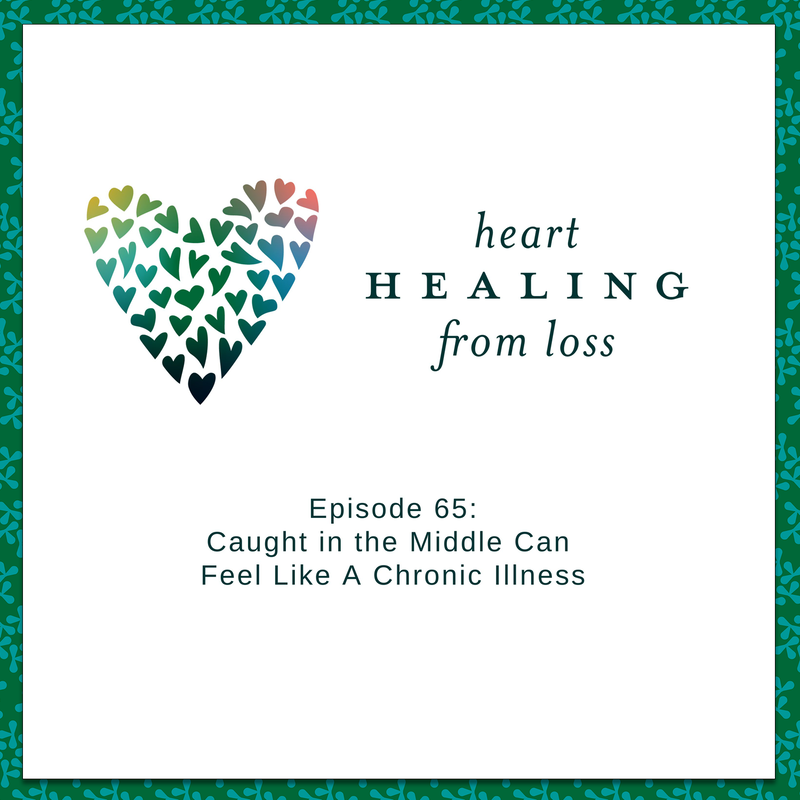Episode 65: Caught in the Middle Can Feel Like A Chronic Illness
|
Are you caught in the middle?
Today Grief Coach & Specialist Wendy Sloneker talks about situations where you might be caught in the middle or at least have the perception of being so. And we all know the “middle” is usually between a rock and a hard place. “The middle” may be the middle of an uncomfortable situation, it could be between two people at odds, it might be the center of a family disagreement. And it’s exhausting. If you’ve ever dealt with chronic illness, this “middle” position might seem familiar — you’re in constant pain, constant struggle, sitting right in the whip seat of an emotional rollercoaster. It takes over your life. Are you feeling pressure? And we make it worse on ourselves, burying ourselves under pressure to perform, to take care of others, or to make everyone happy. |
In these situations, it can be challenging to remember we are not responsible for other people’s feelings. We can only take care of our own. And that’s hard enough.
To help with that, Wendy gives us tips on how to ground ourselves in what feels supportive and right for us, on how to identify our own feelings and ensure we’re taking care of ourselves.
You are Invited:
If you would like to learn more about navigating grief, loss, or finding support through working with Wendy, visit her website: www.wendysloneker.com.
And if you are interested in Wendy’s group coaching program, Going Inside, find more information at goinginside.me.
Book Mentioned:
In My Shoes: A Memoir by Tamara Mellon & William Patrick
To help with that, Wendy gives us tips on how to ground ourselves in what feels supportive and right for us, on how to identify our own feelings and ensure we’re taking care of ourselves.
You are Invited:
If you would like to learn more about navigating grief, loss, or finding support through working with Wendy, visit her website: www.wendysloneker.com.
And if you are interested in Wendy’s group coaching program, Going Inside, find more information at goinginside.me.
Book Mentioned:
In My Shoes: A Memoir by Tamara Mellon & William Patrick
As seen on: |
|
Full Episode Transcript
Wendy Sloneker
You are listening to the Heart Healing from Loss podcast with Wendy Sloneker. This is episode 65. Gosh, we're already at 65.
Hi, hi. Oh my gosh, I'm really glad you're here, I want to talk a little bit about something that I don't normally talk about at all. It's relevant, but it's also an element that can feel complex. So I'm here to normalize in many ways and times, but, um, I was talking with somebody earlier this week who they did not use these words, but it seems like they are caught in kind of a middle, caught in kind of a middle between two different perspectives, two radically different experiences. And I was listening to Tamara Mellon’s, book, I think it's called In Her shoes. Let me just double check that because, you know, facts in my shoes, and Tamara Mellon, In My shoes, she was a co founder of Jimmy Choo and has her own footwear line.
So she mentioned something in her book that was so gorgeous, and so beautiful. And it really resonated with this conversation that I had a little bit earlier this week. That is being caught in the middle can feel like a chronic illness. So my experience with chronic illness has to do with a bulging disc that I had in my neck for a couple of years, which like being in continual dull and sharp pains that sort of move through out my neck and limit my mobility, and just playing hurt. Well, that kind of changed my personality for a little while, because oh and constant oh. And I felt like when I heard her discussing something emotional feeling like a chronic illness, it really made me think of this conversation. So you know, hey, I want to normalize and also offer a couple of elements that may be of use and help.
Now, when somebody's caught in the middle of something emotional. What's important to remember is there can be agendas at play, it's possible to not really understand how you your own self is feeling. Because you're getting so much information or even sometimes demands for loyalty or demands for certain behaviors or demonstrations. So being caught in the middle can be really difficult. Really difficult to know, like one to be there, that's hard, but then to to know how you feel. And to parse out how you feel is also difficult.
This may sound very vague, but you're gonna get it if this resonates so bear with me. Want to remind, I've mentioned this before, but it's been a while, I want to remind that we individuals are the only ones responsible for our feelings. This can be challenging, especially if you are in sort of middle space or perceived middle space where you feel pressure to perform or people please or there's a just a sense of urgency around being accepted or being liked or being belonging.
So remembering that none of us are responsible for anybody else's feelings. While it's difficult, it's also our responsibility because we are the only ones who can take care of our own feelings. Even if you feel like a pressure or an urgency to take care of somebody else. You are still not responsible for their feelings, their emotions, that is their work and their job. And sometimes that's just so challenging to see and understand or even believe sometimes, but I want to offer it here as a way to one give you a break.
Because there isn't anything that you can do to make anybody else's insides be okay. With themselves, everything you do will be external to them. Any effort, any short term, placating, or generosity, or any of that it's all external to another person.
Do you want to be offering what it is you're offering? That's, that's an important feature as well. But you are also just not, there's no way you can make anybody else okay with themselves. There's just no way we think there is. It seems like we have loads and loads of power, but we we don't, when it comes to anybody else's inner game, or inner work. That's their job. And so I talk about this, sometimes a lot depending on which client is bringing me what but people pleasing has been part of my background and my history.
And so applying an emotional detangler for want of a better word like, it is a way of, of offering just a little bit of space and detachment. And that first step really is I'm owning my own feelings. Next step could be, I wonder what I'm feeling about being in the middle, being in the middle and being like a chronic illness like you can be exhausted, and baffled, and not really understand why you're so exhausted or baffled, but energetically, you're just kind of toast.
So being aware that you can take care of your own feelings, the other person, the other party, can take care of their own feelings can also get support that is not 100%. You, even if they don't like it, even if they don't want to, they still can. And that's actually up to them, they have full right to go ahead and do that or not. But that does not mean that you are responsible for them.
So especially true for kids, right, or youngsters who were like, Oh, my gosh, what is going on. If they're caught in the middle of any situation, or caught in the middle between, say two people. So another thing that might be useful in this trajectory is to just not just like that, so minimizing to say just, but to try to ground in what feels safe and supportive for you. At any given moment, like could wake up out of a moment, you could wake up from asleep, you could like what feels supportive and nourishing to you, as you're trying to work with yourself and identify how it is you're feeling or what it is you even need.
This is reasonable. There's a lot of enmeshment out there people's, there's a lot of entanglement and enmeshment and people pleasing, and it's something that we're taught, because as a social being tribal beings, we want to be accepted. And if we're dependent on others for anything, that can be just another layer that makes things sometimes a little bit more urgent or pressurizing. Yeah, that's a word pressurized or complex.
So, one, this is all your insight work. You don't have to tell anybody you're doing it, you can. I hope it's somebody that you trust that you don't feel like you owe anything to just somebody who can listen, maybe the neutral third party, bring it to a therapist or a sponsor or a coach like me or somebody that is that you really trust and feel safe with. And ask them to listen only.
Sometimes you need to just be able to talk to find out how you're feeling. And this is reasonable. There are energetic types that are totally, they know their own truth when they hear it out of their own mouths, but they need to speak it in order to hear it. So I want to offer space for that.
Another thing that might be useful or helpful is to try to identify what other information is needed in order for me to understand what it is, I think, or how I feel. As my own personal experience, do I need another side of a story? Do I need to ask questions do I need to find out what resources are available in any aspect of what I'm caught in the middle of.
Finally, let me give you an example. Because people get weird. People get weird in lots and lots of places. But one of the places that they can get weird is, let's say there are siblings, and let's say that there are parents in a family of origin, okay. And the parents in the family of origin decide whatever they decide for their wishes and their trust and their stuff to go on. And let's say that there's, there's an executor, who is one of the siblings, right. And let's say that there are three siblings total. And that one of the siblings isn't executor doesn't matter which one, but that the other two have ideas or thoughts or feelings or different dynamics, about the relationship with their parents that with those parents that they all all the siblings share.
Based on expectations and dynamics and unspoken desires, that can get weird and painful for the sibling who is the executor or the person who's doing the work to disperse the trust or the will. Like can be really lonely. And that's not your response, like that executor position is its own job that is regulated by law. And it really is not personal to any of the children or siblings. Because that was the parents wishes. That was in writing that was by law, no matter what anybody else thinks, or what their opinions are, or things like that. That executor position can be very lonely, but also really painful, because the executor can't really always be a sibling, and they can feel caught in the middle.
And sometimes when it comes to disbursements, or legacy gifts, or whatever the the error thing is, heir, like it can get uncomfortable and painful. So if something is long and drawn out, or let's say one of the siblings gets like real freaked out and wants to go against the documentation, because this does happen, and wants to procure legal whatever in order to this is all hypothetical, by the way, wants to employ a legal professional in order to get what it is they think they want or think they deserve.
This prolongs the entire and complicates the entire out outline or the way it unfolds. So it can get long and arduous and expensive and painful. And I want to say that it can feel like caught in the middle can feel like a chronic illness. That's just one scenario that I've seen and heard about.
That's also not the only scenario I'm thinking also about young kids who are caught between two adults who are separating or uncoupling or divorcing. It's just hard talk to many young adults and teenagers over the last three years while I've been in this work, and I gotta tell you, I have so much hope and respect for these young people because they are so hungry for more skills in emotional development. Rightfully so, rightfully so, and I'm like actually thrilled
So, I'm thinking of you. I know this is a little bit different this week, but it's important to remember. And it's important to identify that like, oh my gosh, that can be so hard. And, just take a minute and try to, search your own experience. Where am I? Am I in the middle of anything right now? Am I feeling caught in the middle of anything now you might be and you might feel like you are in moods can be two different things. And it can feel really real, even if you're not caught between two things it can feel like you are, I've had that experience myself.
So to recap, we are not responsible for anybody else's feelings. There are plenty of things that each and every human being thinks about that is none of our business. That really is funny and true. And what's the other thing, there may be more information that you need, or that would be helpful for you to understand, in order to make a decision about how you feel or what you think about a certain life event or relationship? or what have you decision, upcoming decision that you want, or need to make?
These are all elements of just like, Okay, what do I think? Because those feelings and thoughts. It's part of your work, and your inside work, we take a lot of action and inaction based on conscious and unconscious thoughts. So there's real value in slowing down even a little bit for just a few minutes to ask yourself, how am I feeling about that and why and why. No, no, why is wrong, but it's important and useful to understand. Okay. So I'm thinking of you. Glad you're here. If you're feeling caught in the middle, and it feels like a chronic illness, some kind. Please take really sweet care of yourself. It's hard. It can be really hard. And I will talk to you next week. Okay, here we go. Bye.
Hey, thanks for listening. And if you are interested in doing a little deeper work in my group coaching program, go to goinginside.me. See what I did there, going inside.me That's an annual program. We can work together in a group setting. And you'll see all the details right there. love to have you join. Thank you for listening, and I'll talk to you next week. Okay, bye!
You are listening to the Heart Healing from Loss podcast with Wendy Sloneker. This is episode 65. Gosh, we're already at 65.
Hi, hi. Oh my gosh, I'm really glad you're here, I want to talk a little bit about something that I don't normally talk about at all. It's relevant, but it's also an element that can feel complex. So I'm here to normalize in many ways and times, but, um, I was talking with somebody earlier this week who they did not use these words, but it seems like they are caught in kind of a middle, caught in kind of a middle between two different perspectives, two radically different experiences. And I was listening to Tamara Mellon’s, book, I think it's called In Her shoes. Let me just double check that because, you know, facts in my shoes, and Tamara Mellon, In My shoes, she was a co founder of Jimmy Choo and has her own footwear line.
So she mentioned something in her book that was so gorgeous, and so beautiful. And it really resonated with this conversation that I had a little bit earlier this week. That is being caught in the middle can feel like a chronic illness. So my experience with chronic illness has to do with a bulging disc that I had in my neck for a couple of years, which like being in continual dull and sharp pains that sort of move through out my neck and limit my mobility, and just playing hurt. Well, that kind of changed my personality for a little while, because oh and constant oh. And I felt like when I heard her discussing something emotional feeling like a chronic illness, it really made me think of this conversation. So you know, hey, I want to normalize and also offer a couple of elements that may be of use and help.
Now, when somebody's caught in the middle of something emotional. What's important to remember is there can be agendas at play, it's possible to not really understand how you your own self is feeling. Because you're getting so much information or even sometimes demands for loyalty or demands for certain behaviors or demonstrations. So being caught in the middle can be really difficult. Really difficult to know, like one to be there, that's hard, but then to to know how you feel. And to parse out how you feel is also difficult.
This may sound very vague, but you're gonna get it if this resonates so bear with me. Want to remind, I've mentioned this before, but it's been a while, I want to remind that we individuals are the only ones responsible for our feelings. This can be challenging, especially if you are in sort of middle space or perceived middle space where you feel pressure to perform or people please or there's a just a sense of urgency around being accepted or being liked or being belonging.
So remembering that none of us are responsible for anybody else's feelings. While it's difficult, it's also our responsibility because we are the only ones who can take care of our own feelings. Even if you feel like a pressure or an urgency to take care of somebody else. You are still not responsible for their feelings, their emotions, that is their work and their job. And sometimes that's just so challenging to see and understand or even believe sometimes, but I want to offer it here as a way to one give you a break.
Because there isn't anything that you can do to make anybody else's insides be okay. With themselves, everything you do will be external to them. Any effort, any short term, placating, or generosity, or any of that it's all external to another person.
Do you want to be offering what it is you're offering? That's, that's an important feature as well. But you are also just not, there's no way you can make anybody else okay with themselves. There's just no way we think there is. It seems like we have loads and loads of power, but we we don't, when it comes to anybody else's inner game, or inner work. That's their job. And so I talk about this, sometimes a lot depending on which client is bringing me what but people pleasing has been part of my background and my history.
And so applying an emotional detangler for want of a better word like, it is a way of, of offering just a little bit of space and detachment. And that first step really is I'm owning my own feelings. Next step could be, I wonder what I'm feeling about being in the middle, being in the middle and being like a chronic illness like you can be exhausted, and baffled, and not really understand why you're so exhausted or baffled, but energetically, you're just kind of toast.
So being aware that you can take care of your own feelings, the other person, the other party, can take care of their own feelings can also get support that is not 100%. You, even if they don't like it, even if they don't want to, they still can. And that's actually up to them, they have full right to go ahead and do that or not. But that does not mean that you are responsible for them.
So especially true for kids, right, or youngsters who were like, Oh, my gosh, what is going on. If they're caught in the middle of any situation, or caught in the middle between, say two people. So another thing that might be useful in this trajectory is to just not just like that, so minimizing to say just, but to try to ground in what feels safe and supportive for you. At any given moment, like could wake up out of a moment, you could wake up from asleep, you could like what feels supportive and nourishing to you, as you're trying to work with yourself and identify how it is you're feeling or what it is you even need.
This is reasonable. There's a lot of enmeshment out there people's, there's a lot of entanglement and enmeshment and people pleasing, and it's something that we're taught, because as a social being tribal beings, we want to be accepted. And if we're dependent on others for anything, that can be just another layer that makes things sometimes a little bit more urgent or pressurizing. Yeah, that's a word pressurized or complex.
So, one, this is all your insight work. You don't have to tell anybody you're doing it, you can. I hope it's somebody that you trust that you don't feel like you owe anything to just somebody who can listen, maybe the neutral third party, bring it to a therapist or a sponsor or a coach like me or somebody that is that you really trust and feel safe with. And ask them to listen only.
Sometimes you need to just be able to talk to find out how you're feeling. And this is reasonable. There are energetic types that are totally, they know their own truth when they hear it out of their own mouths, but they need to speak it in order to hear it. So I want to offer space for that.
Another thing that might be useful or helpful is to try to identify what other information is needed in order for me to understand what it is, I think, or how I feel. As my own personal experience, do I need another side of a story? Do I need to ask questions do I need to find out what resources are available in any aspect of what I'm caught in the middle of.
Finally, let me give you an example. Because people get weird. People get weird in lots and lots of places. But one of the places that they can get weird is, let's say there are siblings, and let's say that there are parents in a family of origin, okay. And the parents in the family of origin decide whatever they decide for their wishes and their trust and their stuff to go on. And let's say that there's, there's an executor, who is one of the siblings, right. And let's say that there are three siblings total. And that one of the siblings isn't executor doesn't matter which one, but that the other two have ideas or thoughts or feelings or different dynamics, about the relationship with their parents that with those parents that they all all the siblings share.
Based on expectations and dynamics and unspoken desires, that can get weird and painful for the sibling who is the executor or the person who's doing the work to disperse the trust or the will. Like can be really lonely. And that's not your response, like that executor position is its own job that is regulated by law. And it really is not personal to any of the children or siblings. Because that was the parents wishes. That was in writing that was by law, no matter what anybody else thinks, or what their opinions are, or things like that. That executor position can be very lonely, but also really painful, because the executor can't really always be a sibling, and they can feel caught in the middle.
And sometimes when it comes to disbursements, or legacy gifts, or whatever the the error thing is, heir, like it can get uncomfortable and painful. So if something is long and drawn out, or let's say one of the siblings gets like real freaked out and wants to go against the documentation, because this does happen, and wants to procure legal whatever in order to this is all hypothetical, by the way, wants to employ a legal professional in order to get what it is they think they want or think they deserve.
This prolongs the entire and complicates the entire out outline or the way it unfolds. So it can get long and arduous and expensive and painful. And I want to say that it can feel like caught in the middle can feel like a chronic illness. That's just one scenario that I've seen and heard about.
That's also not the only scenario I'm thinking also about young kids who are caught between two adults who are separating or uncoupling or divorcing. It's just hard talk to many young adults and teenagers over the last three years while I've been in this work, and I gotta tell you, I have so much hope and respect for these young people because they are so hungry for more skills in emotional development. Rightfully so, rightfully so, and I'm like actually thrilled
So, I'm thinking of you. I know this is a little bit different this week, but it's important to remember. And it's important to identify that like, oh my gosh, that can be so hard. And, just take a minute and try to, search your own experience. Where am I? Am I in the middle of anything right now? Am I feeling caught in the middle of anything now you might be and you might feel like you are in moods can be two different things. And it can feel really real, even if you're not caught between two things it can feel like you are, I've had that experience myself.
So to recap, we are not responsible for anybody else's feelings. There are plenty of things that each and every human being thinks about that is none of our business. That really is funny and true. And what's the other thing, there may be more information that you need, or that would be helpful for you to understand, in order to make a decision about how you feel or what you think about a certain life event or relationship? or what have you decision, upcoming decision that you want, or need to make?
These are all elements of just like, Okay, what do I think? Because those feelings and thoughts. It's part of your work, and your inside work, we take a lot of action and inaction based on conscious and unconscious thoughts. So there's real value in slowing down even a little bit for just a few minutes to ask yourself, how am I feeling about that and why and why. No, no, why is wrong, but it's important and useful to understand. Okay. So I'm thinking of you. Glad you're here. If you're feeling caught in the middle, and it feels like a chronic illness, some kind. Please take really sweet care of yourself. It's hard. It can be really hard. And I will talk to you next week. Okay, here we go. Bye.
Hey, thanks for listening. And if you are interested in doing a little deeper work in my group coaching program, go to goinginside.me. See what I did there, going inside.me That's an annual program. We can work together in a group setting. And you'll see all the details right there. love to have you join. Thank you for listening, and I'll talk to you next week. Okay, bye!






